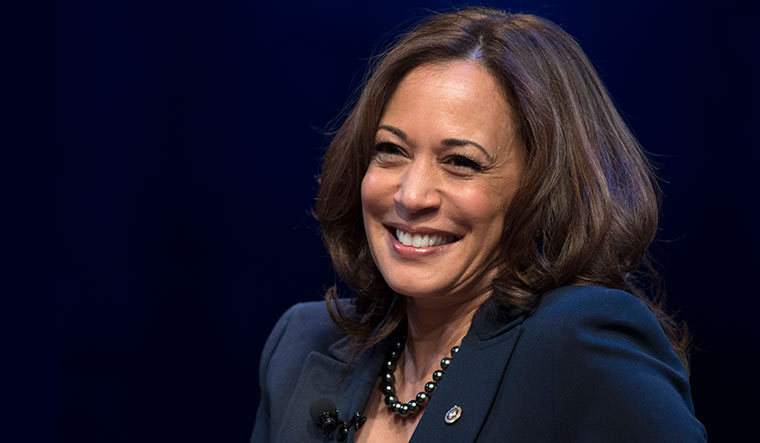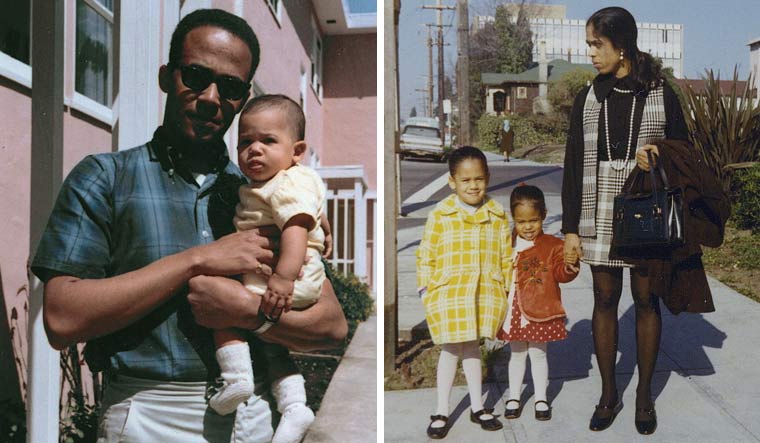Meeting Kamala Harris in the flesh is compelling. I experienced it first hand when I saw her take the stage for a fundraiser in New York two years ago.
More than 500 Indian Americans had gathered to meet one of their own. All of them must have had a Kamala in their circle of family and friends. In her genes and luminous smile, they found echoes of a shared past and ancestry.
An Indian and Jamaican by birth, Senator Harris has been anointed vice presidential candidate and Joe Biden’s running mate in the US presidential election, due in November. Harris, 55, is the first woman of colour contesting the election for the second-highest job in the US.
Who would have thought that 2020 would be the year that all of America learned that Kamala in Sanskrit meant lotus flower. Most Americans find it difficult to pronounce the name correctly, but the fact that they are trying to do so represents the changing face and multicultural spirit of America.
Indeed, according to the Pew Research Center, hers is the face of the future. In a report about multiracial Americans, the researchers noted: “Biden’s selection of Sen Kamala Harris of California as his running mate in this year’s presidential election has sparked a conversation about multiracial identity in the United States. Harris, the daughter of immigrants from Jamaica and India, is among a relatively small but growing group of Americans with a multiracial background.”
In 2019, Harris wrote The Truths We Hold, a memoir that gives insights into her American journey—a rough and tough growing up in Oakland, California, living through segregation and the civil rights movement. She persisted and went on to become the first black and Asian woman to be elected attorney general of California, and the first south Asian woman to be elected to the US Senate.
“Kamala, as you all know, is smart. She’s tough. She’s experienced. She’s a proven fighter for the backbone of this country, the middle class,” said Biden while introducing her as his running mate in the virtual national convention of the Democratic Party in August. “She knows how to govern. She knows how to make the hard calls. She is ready to do this job on day one.”
At the convention, Harris showed how strong her Indian roots were by showcasing the biggest influence of her life, her mother Shyamala Gopalan. “She came here from India at age 19 to pursue her dream of curing cancer,” Harris said. “At the University of California Berkeley, she met my father, Donald Harris, who had come from Jamaica to study economics. They fell in love in that most American way—while marching together for justice in the civil rights movement of the 1960s. In the streets of Oakland and Berkeley, I got a stroller’s-eye view of people getting into what the great John Lewis called ‘good trouble’.”
Good trouble became a mantra of her life, which Harris has dedicated to fighting injustice and inequality. “My mother instilled in my sister Maya and me the values that would chart the course of our lives,” she said. “She raised us to be proud, strong black women, and she raised us to know and be proud of our Indian heritage.”
In her speech, Harris said of her mother: “She taught us to be conscious and compassionate about the struggles of all people, to believe public service is a noble cause, and the fight for justice is a shared responsibility.” It led Harris to become a lawyer, a district attorney, attorney general and a United States senator. “And at every step of the way, I have been guided by the words I spoke from the first time I stood in a courtroom — Kamala Harris, for the people,” she said.
Biden’s choice has been well received. As the New York Times noted, “In announcing Ms Harris, 55, as his vice-presidential nominee, Joseph R. Biden told supporters she was the person best equipped to ‘take this fight’ to President Trump, making space in a campaign premised on restoring American decency for a willing brawler who learned early in her career that fortune would not favour the meek among black women in her lines of work.”
Harris has been hailed as the female Obama. She represents many different groups that see themselves reflected in her. Her family, too, is multicultural; her husband, Doug Emhoff, is Jewish and her stepchildren lovingly call her ‘Momala’.
According to Impact, a leading Indian American advocacy group, an estimated 1.3 million Indian Americans are expected to vote in this year’s election, including two lakh in Pennsylvania and 1.25 lakh in Michigan, both must-win battleground states. “Kamala Harris’s story is the story of a changing, inclusive America. At a time of rapid change, she ties all our national threads together,” said Neil Makhija, Impact’s executive director. “She represents the future and promise of this country. Her candidacy is historic and inspiring, not only for black Americans but for millions of Asian American voters, the fastest-growing voting bloc in the country.”
Manisha Sinha, professor of history at the University of Connecticut, termed Biden’s decision to pick Harris a “personal gift”. “Not only does she represent the very groups mocked and vilified by Trump—women, black people and immigrants—but also, as a woman of Afro-Indian descent, she might well be the future face of American politics,” she said.
Subodh Chandra, a civil rights lawyer and former law director of the City of Cleveland, Ohio, has seen Harris interacting with children and the elderly up close. She once met his elderly parents and immediately took to his mother, addressing her as aunty and interacting as if the two had long been relatives. When she met his three sons—triplets—there was so much hugging, and not of the kind meant for a politician’s photo op. “The sense you get from her is that she is someone who really values family, kids and good cooking,” said Chandra. “On Twitter, you have all these funny videos of her instructing her husband on food preparation.”
At work, he said, she exudes magnetism and positivity. She can quickly cut to the truth and expose someone who is talking nonsense. “These qualities are going to make her a magnificent candidate and asset to the ticket and the country. And, I think, eventually our first female president,” Chandra said.
Shelly Kapoor Collins, a venture capitalist who lives in San Francisco, has known Harris since 1998. Four years ago, when Harris ran for the Senate, Collins’s mother gave her a silver Lakshmi coin, saying she would go very far. The blessing seems to have worked.
“You have to meet her to understand there is something very charismatic about her,” she said. “She is fierce—and I love that in a woman who is so strong and has paved the way for other women. She has a bold vision for the country and you believe her when she talks; her authenticity really comes through.”
Some feel that Harris is not Indian enough. Collins, however, disagrees with that view. “As Indian Americans, we need to rally around our candidate not because of shared heritage but because of shared values,” she said. “I believe in her vision. I believe in what she wants for America. The Indian American community needs to align itself with values, not just with identities.”
Lavina Melwani is a New York-based journalist who blogs at 'Lassi with Lavina'.



